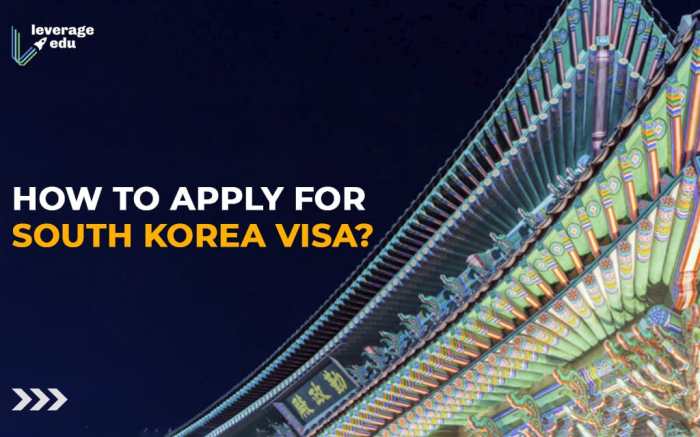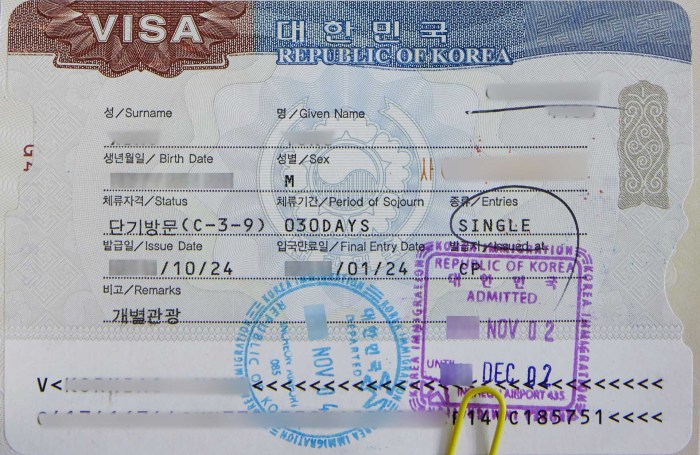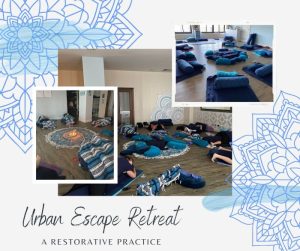
Planning a trip to South Korea? Securing a visa is a crucial first step, and understanding the processing time is key to efficient travel planning. The duration varies significantly depending on several factors, including the type of visa applied for, the completeness of your application, and even the time of year. This guide aims to demystify the process, providing insights into expected wait times and helping you prepare for your South Korean adventure.
From tourist visas for short stays to longer-term business or student visas, the application process and associated timelines differ. Knowing what to expect in terms of processing time allows you to plan your travel itinerary accordingly, avoiding potential delays and ensuring a smooth journey. We’ll break down the average processing times for various visa types, explore influencing factors, and offer helpful tips to streamline your application.
Visa Processing Time
Obtaining a visa to South Korea can involve varying processing times depending on several factors. Understanding these factors and the typical processing durations for different visa types is crucial for effective planning. This section details the average processing times and influences on the speed of visa application processing.
Average Processing Times for South Korean Visas
The processing time for a South Korean visa is not fixed and can fluctuate. While the Embassy or Consulate aims for efficiency, several factors contribute to variations in processing speed. Generally, expect a range from a few days to several weeks. Express services may be available for an additional fee, but these are not guaranteed to expedite the process significantly.
Always check the official website of the South Korean embassy or consulate in your country for the most up-to-date information.
Factors Influencing Visa Processing Speed
Several key factors can significantly influence how quickly your South Korean visa application is processed. These include the completeness and accuracy of your application, the time of year you apply, and your nationality.
Application Completeness: Submitting a complete and accurate application is paramount. Missing documents or inconsistencies in information can lead to delays as the embassy requests further clarification or documentation. Ensure all required forms are filled out correctly and all supporting documents are included. Carefully review the checklist provided by the embassy or consulate before submitting your application.
Time of Year: Application processing times can be longer during peak seasons, such as holidays or school semesters. If possible, avoid applying during these periods to minimize potential delays. The volume of applications directly impacts processing times.
Nationality: Your nationality can also influence processing times. Applicants from certain countries might face more stringent scrutiny or longer processing periods due to varying bilateral agreements or visa policies. It is advisable to check the specific requirements for your nationality on the embassy’s website.
Visa Processing Time Comparison Table
The table below provides a general comparison of average processing times for different South Korean visa categories. These are estimates and actual processing times may vary. Always refer to the official sources for the most accurate and up-to-date information.
| Visa Type | Average Processing Time | Factors Influencing Time | Example Scenario |
|---|---|---|---|
| Tourist Visa | 2-4 weeks | Seasonality, application completeness, nationality | A US citizen applying during the off-season with a complete application might receive their visa within 2 weeks, while someone applying during peak season with minor application errors could take closer to 4 weeks. |
| Business Visa | 4-6 weeks | Nature of business, supporting documents, company reputation | An established company with strong documentation may see faster processing, while a new business might require more time for verification. |
| Student Visa | 6-8 weeks | University acceptance, financial proof, academic background | A student with a strong academic record and clear financial backing might receive their visa sooner than a student whose application requires further verification. |
| Work Visa | 8-12 weeks | Job offer details, employer’s reputation, skill assessment | A highly skilled individual with a strong job offer from a reputable company might experience faster processing than someone with less experience or a less established employer. |
Required Documents for a South Korean Visa

Applying for a South Korean visa requires careful preparation of the necessary documentation. Ensuring all documents are complete and accurate will streamline the application process and increase the likelihood of a successful outcome. The specific requirements may vary slightly depending on your nationality and the type of visa you are applying for, so always check the official website of the South Korean embassy or consulate in your country for the most up-to-date information.The following checklist provides a general overview of the documents typically required for a South Korean visa application.
Remember to make copies of all original documents.
Application Form
The visa application form must be completed accurately and completely. This form will request personal information, travel details, and the purpose of your visit to South Korea. Ensure you read all instructions carefully and provide truthful information. Examples of information required include your full name, date of birth, passport details, contact information, and travel dates. Incomplete or inaccurate forms will likely result in delays or rejection of your application.
Passport
Your passport must be valid for at least six months beyond your intended stay in South Korea. It should have at least two blank pages for visa stamping. A damaged or worn passport might be rejected. Ensure your passport is in good condition, and if you have old passports, keep them for reference. The passport serves as your primary identification document throughout your trip.
Passport Photos
You will need recent passport-sized photographs that meet specific requirements. These photos usually need to be taken within the last six months and have a plain white background. They should show a clear, frontal view of your face and adhere to specific size and quality standards Artikeld by the South Korean embassy or consulate. Avoid wearing glasses or hats unless medically necessary.
The quality of your photos is important for a smooth application process.
Proof of Financial Means
You must demonstrate sufficient funds to support yourself during your stay in South Korea. Acceptable proof includes bank statements showing sufficient funds in your account for the duration of your trip, a letter from your bank confirming your financial standing, or proof of sponsorship from a person or organization in South Korea. The required amount will vary depending on the length of your stay and your purpose of visit.
It is important to provide sufficient evidence to support your claim of financial stability.
Travel Itinerary
Provide a detailed itinerary of your planned trip, including flight reservations, hotel bookings, and any planned activities. This demonstrates a clear plan for your visit and helps the visa officer assess your travel intentions. The itinerary should be comprehensive and align with the purpose of your visa application. A flexible itinerary might be viewed less favorably than a well-defined plan.
Purpose of Visit Documentation
Depending on the type of visa you are applying for, you will need supporting documents that justify the purpose of your visit. For example, if applying for a tourist visa, you may need to provide evidence of travel insurance, a copy of your flight tickets, and hotel bookings. If applying for a business visa, you may need a letter of invitation from your business partner in South Korea.
For a student visa, you will need an acceptance letter from a South Korean university. The documentation must clearly establish the legitimacy of your visit.
Health Insurance
Proof of adequate health insurance coverage for the duration of your stay in South Korea is generally required. This insurance should cover medical emergencies and hospitalizations. Your insurance policy should clearly state the coverage details and duration of validity. An inadequate insurance policy could be a reason for visa rejection. Check that your policy meets the minimum requirements set by the South Korean embassy or consulate.
Vacation Packages to South Korea
Planning a trip to South Korea can be exciting, but navigating the options can feel overwhelming. To simplify the process, we’ve designed three sample vacation packages catering to different budgets and interests, providing a framework for your own personalized South Korean adventure. These packages offer a balance of cultural immersion, historical exploration, and modern entertainment, ensuring a memorable experience regardless of your spending preferences.
Sample South Korea Vacation Packages
The following table Artikels three distinct vacation packages to South Korea, each designed with a specific budget and traveler profile in mind. Estimated costs are based on average prices and may vary depending on the time of year, specific accommodations chosen, and individual spending habits. Remember that flights are not included in these estimates.
| Package Name | Duration | Activities & Highlights | Estimated Cost (USD) |
|---|---|---|---|
| Budget Backpacker Adventure | 7 Days | Hostel accommodation, exploring Seoul’s free attractions (like Gyeongbokgung Palace and Bukchon Hanok Village), utilizing public transport, street food experiences, hiking in Bukhansan National Park. | $700 – $1000 (excluding flights) |
| Mid-Range Cultural Immersion | 10 Days | Comfortable hotel stays in Seoul and Busan, guided tours of historical sites (including DMZ tour), exploring local markets (like Namdaemun Market), enjoying traditional Korean performances, trying various regional cuisines, high-speed train travel between cities. | $1500 – $2500 (excluding flights) |
| Luxury Seoul & Jeju Island Escape | 14 Days | Luxury hotel stays in Seoul and Jeju Island, private guided tours, fine dining experiences, shopping at high-end boutiques, spa treatments, exploring Jeju’s volcanic landscapes and beaches, private transportation. | $4000 – $7000+ (excluding flights) |
Vacation Programs in South Korea
South Korea offers a diverse range of vacation experiences, catering to various interests and preferences. From exploring bustling cities to immersing oneself in serene natural landscapes, there’s a program to suit every traveler. The following Artikels three distinct vacation programs highlighting their unique features and target audiences.
Cultural Immersion Program: Seoul & Beyond
This program focuses on experiencing the rich history and vibrant culture of South Korea. Participants will spend several days exploring Seoul, visiting iconic landmarks such as Gyeongbokgung Palace, the Bukchon Hanok Village, and the DMZ (Demilitarized Zone). The program also includes traditional Korean cooking classes, tea ceremonies, and opportunities to interact with local artisans and communities. Participants will gain a deep understanding of Korean customs, traditions, and contemporary life.
This program is ideal for travelers interested in history, culture, and authentic experiences. It’s suitable for individuals, couples, and small groups seeking a meaningful cultural exchange. The itinerary typically includes guided tours, cultural demonstrations, and free time for independent exploration.
Nature and Adventure Program: Jeju Island Exploration
This program centers around the stunning natural beauty of Jeju Island, a volcanic island off the southern coast of Korea. Activities include hiking scenic trails, exploring lava tubes, visiting waterfalls, and relaxing on pristine beaches. Water sports like snorkeling and diving are also available, depending on the season. The program emphasizes outdoor activities and allows participants to connect with the island’s unique ecosystem.
This program is perfect for adventurous travelers who enjoy hiking, exploring nature, and engaging in water sports. It is suitable for individuals, couples, and families seeking an active and rejuvenating vacation. The program may include guided hikes, opportunities for independent exploration, and access to various water sports facilities.
K-Pop & Entertainment Program: Seoul’s Pop Culture Scene
This program caters to fans of K-Pop and Korean entertainment. It includes visits to entertainment agencies, K-Pop themed cafes, and opportunities to attend concerts or fan meetings (depending on availability and scheduling). Participants will also learn about the history and evolution of the K-Pop industry and explore the vibrant nightlife and entertainment districts of Seoul. The program provides an immersive experience into the world of Korean pop culture.
This program is ideal for K-Pop enthusiasts, music lovers, and those interested in experiencing the dynamic entertainment scene of Seoul. It is suitable for individuals, groups of friends, and families with older children who appreciate K-Pop and Korean entertainment. The itinerary may include behind-the-scenes tours, workshops, and access to exclusive events.
Venture Capital in South Korea (Tangentially Related)

South Korea’s venture capital (VC) market has experienced significant growth in recent years, driven by a combination of factors including government initiatives promoting innovation, a burgeoning tech sector, and increasing participation from both domestic and international investors. While still smaller than some Western markets, the Korean VC landscape is dynamic and offers considerable opportunities for startups and investors alike.
However, it’s also a competitive market with unique characteristics.The South Korean VC market is characterized by a strong focus on specific sectors, reflecting both national strategic priorities and market trends. Government support programs often play a crucial role in shaping investment flows, directing funding towards areas deemed vital for economic growth and technological advancement. Furthermore, the strong presence of large conglomerates (“chaebols”) can influence investment patterns, often creating both opportunities and challenges for smaller startups seeking funding.
Key Sectors Attracting Venture Capital Investment
Three key sectors currently attracting significant venture capital investment in South Korea are biotechnology, information technology (IT), and artificial intelligence (AI). These sectors reflect the country’s strengths in technological innovation and its ambitions to become a global leader in cutting-edge technologies.Biotechnology in South Korea benefits from a strong foundation in life sciences research and a supportive regulatory environment. Significant investments are flowing into companies developing innovative pharmaceuticals, medical devices, and diagnostic tools.
For example, large pharmaceutical companies are actively partnering with smaller biotech startups, providing access to resources and expertise while fueling the growth of the sector. This collaborative approach is crucial for translating research breakthroughs into commercially viable products.The IT sector, particularly within areas such as mobile technology, e-commerce, and fintech, remains a dominant force in attracting VC funding.
South Korea’s high internet penetration and tech-savvy population create a fertile ground for innovation and rapid market adoption of new technologies. The success of Korean tech giants like Samsung and Naver has also created a vibrant ecosystem that attracts both domestic and international investment. For example, mobile payment solutions and innovative e-commerce platforms consistently attract significant VC attention due to their potential for high growth and market disruption.The AI sector is experiencing explosive growth, fueled by increasing demand for AI-powered solutions across various industries.
Investments are focused on companies developing advanced algorithms, AI-driven software, and applications for various sectors, including healthcare, finance, and manufacturing. The Korean government’s strategic focus on AI development, through initiatives such as providing funding and fostering collaboration between academia and industry, further enhances the attractiveness of this sector for VC investors. A prominent example is the increasing number of startups developing AI solutions for improving efficiency and productivity in manufacturing processes.
Obtaining a South Korean visa, while requiring careful preparation and attention to detail, is a manageable process. Understanding the factors that influence processing times – from visa type and application completeness to seasonal fluctuations – empowers you to plan effectively. By proactively addressing these elements and utilizing the resources provided, you can significantly improve your chances of a swift and successful visa application, paving the way for a memorable trip to South Korea.
Query Resolution
What happens if my visa application is rejected?
If your application is rejected, you will typically receive a notification explaining the reasons. You may be able to reapply after addressing the issues identified.
Can I track the status of my visa application?
Many South Korean embassies and consulates offer online tracking systems where you can monitor the progress of your application. Check the specific website of the relevant embassy or consulate.
What if I need my visa urgently? Is expedited processing available?
Expedited processing might be available but usually comes with an additional fee. Contact the embassy or consulate directly to inquire about this option.
Can I apply for a visa in person or only online?
Both in-person and online applications are usually accepted, depending on the embassy or consulate and the visa type. Check the specific requirements on their website.






